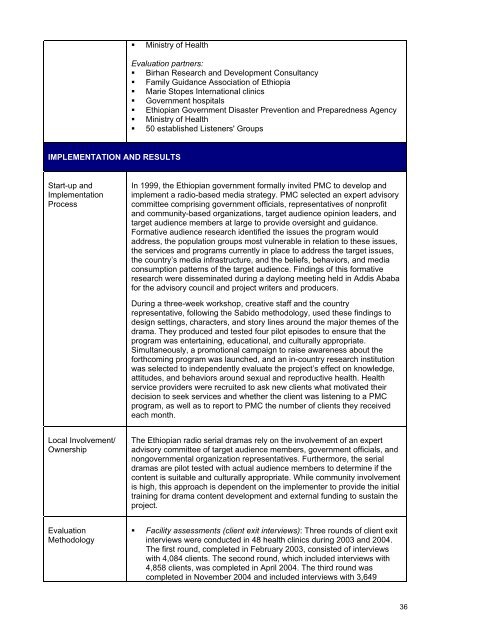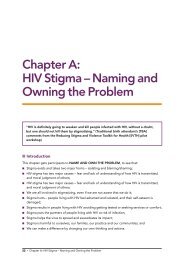Implementing Multiple Gender Strategies to Improve HIV and ... - ICRW
Implementing Multiple Gender Strategies to Improve HIV and ... - ICRW
Implementing Multiple Gender Strategies to Improve HIV and ... - ICRW
You also want an ePaper? Increase the reach of your titles
YUMPU automatically turns print PDFs into web optimized ePapers that Google loves.
• Ministry of Health<br />
Evaluation partners:<br />
• Birhan Research <strong>and</strong> Development Consultancy<br />
• Family Guidance Association of Ethiopia<br />
• Marie S<strong>to</strong>pes International clinics<br />
• Government hospitals<br />
• Ethiopian Government Disaster Prevention <strong>and</strong> Preparedness Agency<br />
• Ministry of Health<br />
• 50 established Listeners' Groups<br />
IMPLEMENTATION AND RESULTS<br />
Start-up <strong>and</strong><br />
Implementation<br />
Process<br />
In 1999, the Ethiopian government formally invited PMC <strong>to</strong> develop <strong>and</strong><br />
implement a radio-based media strategy. PMC selected an expert advisory<br />
committee comprising government officials, representatives of nonprofit<br />
<strong>and</strong> community-based organizations, target audience opinion leaders, <strong>and</strong><br />
target audience members at large <strong>to</strong> provide oversight <strong>and</strong> guidance.<br />
Formative audience research identified the issues the program would<br />
address, the population groups most vulnerable in relation <strong>to</strong> these issues,<br />
the services <strong>and</strong> programs currently in place <strong>to</strong> address the target issues,<br />
the country’s media infrastructure, <strong>and</strong> the beliefs, behaviors, <strong>and</strong> media<br />
consumption patterns of the target audience. Findings of this formative<br />
research were disseminated during a daylong meeting held in Addis Ababa<br />
for the advisory council <strong>and</strong> project writers <strong>and</strong> producers.<br />
During a three-week workshop, creative staff <strong>and</strong> the country<br />
representative, following the Sabido methodology, used these findings <strong>to</strong><br />
design settings, characters, <strong>and</strong> s<strong>to</strong>ry lines around the major themes of the<br />
drama. They produced <strong>and</strong> tested four pilot episodes <strong>to</strong> ensure that the<br />
program was entertaining, educational, <strong>and</strong> culturally appropriate.<br />
Simultaneously, a promotional campaign <strong>to</strong> raise awareness about the<br />
forthcoming program was launched, <strong>and</strong> an in-country research institution<br />
was selected <strong>to</strong> independently evaluate the project’s effect on knowledge,<br />
attitudes, <strong>and</strong> behaviors around sexual <strong>and</strong> reproductive health. Health<br />
service providers were recruited <strong>to</strong> ask new clients what motivated their<br />
decision <strong>to</strong> seek services <strong>and</strong> whether the client was listening <strong>to</strong> a PMC<br />
program, as well as <strong>to</strong> report <strong>to</strong> PMC the number of clients they received<br />
each month.<br />
Local Involvement/<br />
Ownership<br />
The Ethiopian radio serial dramas rely on the involvement of an expert<br />
advisory committee of target audience members, government officials, <strong>and</strong><br />
nongovernmental organization representatives. Furthermore, the serial<br />
dramas are pilot tested with actual audience members <strong>to</strong> determine if the<br />
content is suitable <strong>and</strong> culturally appropriate. While community involvement<br />
is high, this approach is dependent on the implementer <strong>to</strong> provide the initial<br />
training for drama content development <strong>and</strong> external funding <strong>to</strong> sustain the<br />
project.<br />
Evaluation<br />
Methodology<br />
• Facility assessments (client exit interviews): Three rounds of client exit<br />
interviews were conducted in 48 health clinics during 2003 <strong>and</strong> 2004.<br />
The first round, completed in February 2003, consisted of interviews<br />
with 4,084 clients. The second round, which included interviews with<br />
4,858 clients, was completed in April 2004. The third round was<br />
completed in November 2004 <strong>and</strong> included interviews with 3,649<br />
36
















